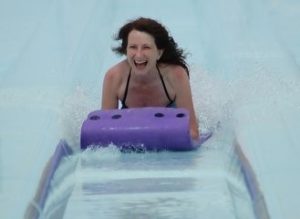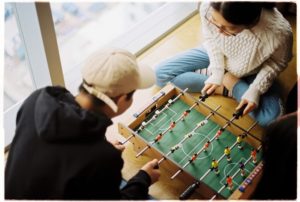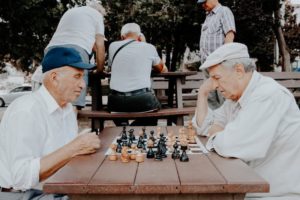Playtime: Fun for All!
By Cindy Roe and Marie-Lise Baroutjian
NY Project Hope is a crisis counseling program that provides support and resources to help people cope with the challenges of the Covid-19 pandemic.
 An important part of self-care, doing something just for the sheer fun of it is a great way to reduce stress. In this installment of our weekly blog, we’ll look at the connections between leisure time and a healthy work/life balance.
An important part of self-care, doing something just for the sheer fun of it is a great way to reduce stress. In this installment of our weekly blog, we’ll look at the connections between leisure time and a healthy work/life balance.
What does a balanced life look like?
Having down time where we do fun things gives us a chance to release the pent-up angst and frustrations we’re subjected to at work. Indeed, life  can’t all be about work; focusing too much on our job to the exclusion of our own needs is a recipe for burnout, which can also lead to other serious complications, such as heart disease, insomnia, mood instability, and substance misuse, not to mention decreased job satisfaction. In fact, a recent survey that looked at workplace stress indicated that 75% of workers reported feeling job related burnout at some point in their careers, with 67% of them reporting an even higher degree of stress during the Covid lockdowns. Considering the common reactions people have to any type of catastrophic event-such as feeling overwhelmed, frightened, anxious, or depressed-it’s no wonder why so many of us are experiencing these types of emotions in the wake of the pandemic, even though feeling this way is perfectly normal given the circumstances. Thus, it’s easy to see why maintaining a stable balance between our own needs and the daily obligations we must fulfill is necessary for keeping our mental and physical health in check.
can’t all be about work; focusing too much on our job to the exclusion of our own needs is a recipe for burnout, which can also lead to other serious complications, such as heart disease, insomnia, mood instability, and substance misuse, not to mention decreased job satisfaction. In fact, a recent survey that looked at workplace stress indicated that 75% of workers reported feeling job related burnout at some point in their careers, with 67% of them reporting an even higher degree of stress during the Covid lockdowns. Considering the common reactions people have to any type of catastrophic event-such as feeling overwhelmed, frightened, anxious, or depressed-it’s no wonder why so many of us are experiencing these types of emotions in the wake of the pandemic, even though feeling this way is perfectly normal given the circumstances. Thus, it’s easy to see why maintaining a stable balance between our own needs and the daily obligations we must fulfill is necessary for keeping our mental and physical health in check.
The Benefits of Playtime
 First and foremost, engaging in playful activities has been shown to be effective at reducing stress, thanks to the release of endorphins by the brain. Endorphins are those feel-good chemicals that help shut down the body’s stress response; when that happens, we feel more relaxed. Also, because play typically isn’t something that adults do on a regular basis, a side benefit is that it helps improve our overall brain function, due to the way it stimulates the growth of new neural pathways in different parts of our gray matter. So, play can be thought of as a positive coping strategy; since these pathways are built and strengthened each time we’re having fun, not only are we getting a stronger dose of those stress-busting endorphins immediately, we’ll also be less likely to feel overwhelmed the next time challenging situations arise.
First and foremost, engaging in playful activities has been shown to be effective at reducing stress, thanks to the release of endorphins by the brain. Endorphins are those feel-good chemicals that help shut down the body’s stress response; when that happens, we feel more relaxed. Also, because play typically isn’t something that adults do on a regular basis, a side benefit is that it helps improve our overall brain function, due to the way it stimulates the growth of new neural pathways in different parts of our gray matter. So, play can be thought of as a positive coping strategy; since these pathways are built and strengthened each time we’re having fun, not only are we getting a stronger dose of those stress-busting endorphins immediately, we’ll also be less likely to feel overwhelmed the next time challenging situations arise.
Fosters Resilience. Psychological research into the connections between play and personal well-being found that doing something for the sheer joy that it brings leads to increases in people’s positive feelings and their outlook on life, which are key features of personal resilience. According to the broaden  and build theory, resilient people are not only more likely to identify the good things that are happening in their life, they also tend to seek out ways to sustain their positivity by bringing even more of the good into their lives. Additionally, resilient people are more likely to operate from an internal locus of control, whereby they feel more confident in their abilities to direct the course of their lives. Rather than viewing problems simply as bad things that happen to them, they instead see these instances as challenges to be overcome, relishing them as opportunities for personal growth. Thus, those with a positive outlook are more likely to effectively cope with life’s stressors not only because they’re more resilient, but also because they keenly recognize the benefits of incorporating some downtime into their lives.
and build theory, resilient people are not only more likely to identify the good things that are happening in their life, they also tend to seek out ways to sustain their positivity by bringing even more of the good into their lives. Additionally, resilient people are more likely to operate from an internal locus of control, whereby they feel more confident in their abilities to direct the course of their lives. Rather than viewing problems simply as bad things that happen to them, they instead see these instances as challenges to be overcome, relishing them as opportunities for personal growth. Thus, those with a positive outlook are more likely to effectively cope with life’s stressors not only because they’re more resilient, but also because they keenly recognize the benefits of incorporating some downtime into their lives.
 Doing things with others builds and strengthens our social connections and helps reinforce social skills. Another important aspect of our personal well-being, having a strong social support system has also been found to be an effective mitigation strategy against stress. And, as with any knowledge or skill, the more you use something, the better you get at it. As children, we learned appropriate social behaviors such as taking turns, teamwork, cooperation, and how to handle winning and losing gracefully when we played with others. Playful activities still give adults lots of opportunities to further sharpen these important people skills. In the workplace, for example, employees who were given the time and tools to engage in fun, playful activities reported stronger workplace morale, and found team-based work more interesting and engaging, while employers noted increases in worker productivity.
Doing things with others builds and strengthens our social connections and helps reinforce social skills. Another important aspect of our personal well-being, having a strong social support system has also been found to be an effective mitigation strategy against stress. And, as with any knowledge or skill, the more you use something, the better you get at it. As children, we learned appropriate social behaviors such as taking turns, teamwork, cooperation, and how to handle winning and losing gracefully when we played with others. Playful activities still give adults lots of opportunities to further sharpen these important people skills. In the workplace, for example, employees who were given the time and tools to engage in fun, playful activities reported stronger workplace morale, and found team-based work more interesting and engaging, while employers noted increases in worker productivity.
Bring On the Fun!
When choosing ways to incorporate more play into our lives, a recommendation from Dr. Stuart Brown, renowned psychologist, is to think back to our childhood, and consider the following questions: How did you play? What did you enjoy doing? From roller skates, frisbee, and summertime Marco Polo matches to video, board, or card games, the sky’s the limit on what might inspire you to channel your inner child.
Remember, you don’t have to go it alone- If you’re feeling overwhelmed or if you need help with coping with your stress, the Crisis Counselors for NY Project Hope at Independent Living are always available to help. Sometimes it can be helpful to talk to someone you don’t know! Want to know more about how we can help? Give us a call at 845-762-2275. Talking to us is always free, anonymous, and confidential.
Cindy Roe and Marie-Lise Baroutjian are crisis counselors from Independent Living, Inc. working on with the NY Project Hope program.
Further Reading:
Why Adults Need Playtime, Too, by Elizabeth Scott. Verywellmind.com
Not just for children-Adults need play for stress relief. From Health Wise Clinical Nutrition, drflannery.com
The Benefits of Play for Adults, by Robinson, Smith, Segal and Shubin, from Helpguide.org.
The Practice of Play, by Dr. Stuart Brown, from Taking Charge of Your Health and Well-Being.

